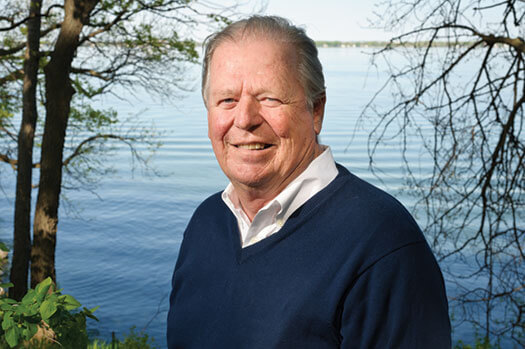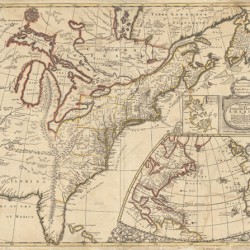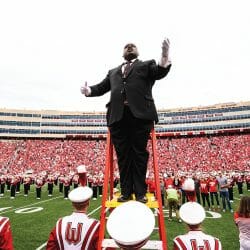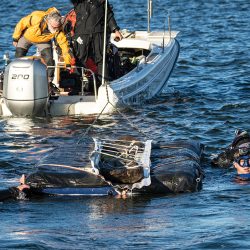Anders Andren
The Sea Grant’s long-time director charts a new course.
After two decades as director of the UW’s Sea Grant Institute, Anders Andren is ready to sail off into retirement. The Finnish native was on the faculty of the College of Engineering, teaching courses in aquatic analytical chemistry, and rose to prominence with studies of pollutants delivered by the Mississippi River into the Gulf of Mexico. Under his leadership, the Sea Grant Institute has fostered studies of pollutants, invasive species, aquaculture, and aquaponics.
How did you become interested in marine science?
I grew up on the Åland Islands in the Baltic, where one of the major businesses was shipping. My father was a sea captain. I spent a lot of time at sea in my youth. I traveled all over the world with him. Everywhere, you name it. Except landlocked countries. When he was about fifty years old, his ship company got heavily into the car-carrying trade between North America and Europe. He was asked to head up the operation for North America, and that’s when [I decided] to come over here for a year and check things out. But here I am.
UW–Madison is about a thousand miles from any seashore. How is it that we have a Sea Grant Institute?
Well, the enabling legislation says that a Sea Grant Institute shall be situated on our nation’s marine or Great Lakes coast. In fact, every single Great Lakes state has a Sea Grant Institute — although Illinois’s and Indiana’s is combined. New York and Wisconsin are by far the largest Great Lakes Sea Grant programs. As a matter of fact, we’re one of the larger ones in the nation.
What’s Sea Grant’s role on campus?
Actually, Sea Grant is a [UW] System institute. It’s analogous to the land-grant concept, in that the law says that the nation should avail itself of our major universities, research universities, so that we will assure ourselves of sustainable ecological and economic improvements of our marine and Great Lakes resources.
It’s absolutely and truly an embodiment of the Wisconsin Idea. We spend a lot of time understanding the research priorities of the Great Lakes, and we also have a lot of citizen stakeholder meetings along the shores of Lake Michigan and Lake Superior. And then we support over a hundred faculty, staff, and students throughout the System, plus places like Marquette, St. Norbert’s, Lawrence — we support them to do research on the priorities that we determine.
What do you see as the current priorities for the Great Lakes?
What we’re trying to do right now is understand what the effect of global warming has been on the Great Lakes. So just as an example, Lake Superior, in the last ten years has seen its average temperature … three to five degrees warmer than the previous 150 years.
The other huge area of concern is pathogens — viruses and bacteria that have arrived from foreign continents. We are seeing some of these show up on our beaches. They contribute to beach closings.
We’re also looking at aquaculture and supporting a vigorous program. In particular, we’re interested in cool-water fishes, primarily the yellow perch. You know how it is in the Midwest, with the Friday-night fish fry — the number-one delicacy is yellow perch. Up until about a year or two ago, nobody knew how to get yellow perch to spawn more than once a year. But a breakthrough by Sea Grant–supported research over in Milwaukee has found a way [to help aquaculturists] spawn yellow perch at any time.
What’s next for you?
I’ve been fortunate to work with some of the world’s best at what they do. It’s a privilege to have the best staff anybody could have to work with — talented and just fun to be around. But I’m going to keep active. I’m going to be involved in a number of projects overseas, in places like Costa Rica and Tanzania and Zimbabwe. My oldest son is involved in eco-philanthropy on a large scale, and he’s convinced me to help out on several projects.
I understand that you also have a band.
How did you hear about that? About ten years ago, my Sea Grant colleagues and I put together a band, and we called ourselves the Not-So-Muddy-Waters Blues Band. We get together once a year, or every other year, and perform.
I used to, in my misspent youth, have my own rock ’n’ roll band. In the summertime, we played dances, mainly, in the Åland Islands. That’s where I cut my teeth and really learned to play guitar. But my problem is that I can’t really read music. I learned how to write what is called MIDI [Musical Instrument Digital Interface] music, which is a form of computer language to write music. I still do that in my spare time at night, lay down tracks.
Published in the Summer 2012 issue




Comments
Chuck Madenjian June 8, 2012
Dear Anders,
Here’s wishing you all the best in your retirement. Thanks for doing such a fantastic job of directing the University of Wisconsin Sea Grant program!!!!
Chuck Madenjian
Steve Eisenreich December 4, 2014
Hi Anders, great to see that you have excelled all these years at UW-Madison and at Sea Grant. I have so many fond memories of those years along the lake. As I am now also retired as well or rather just pursuing another academic career in Europe, I wish you the very best. Steve Eisenreich